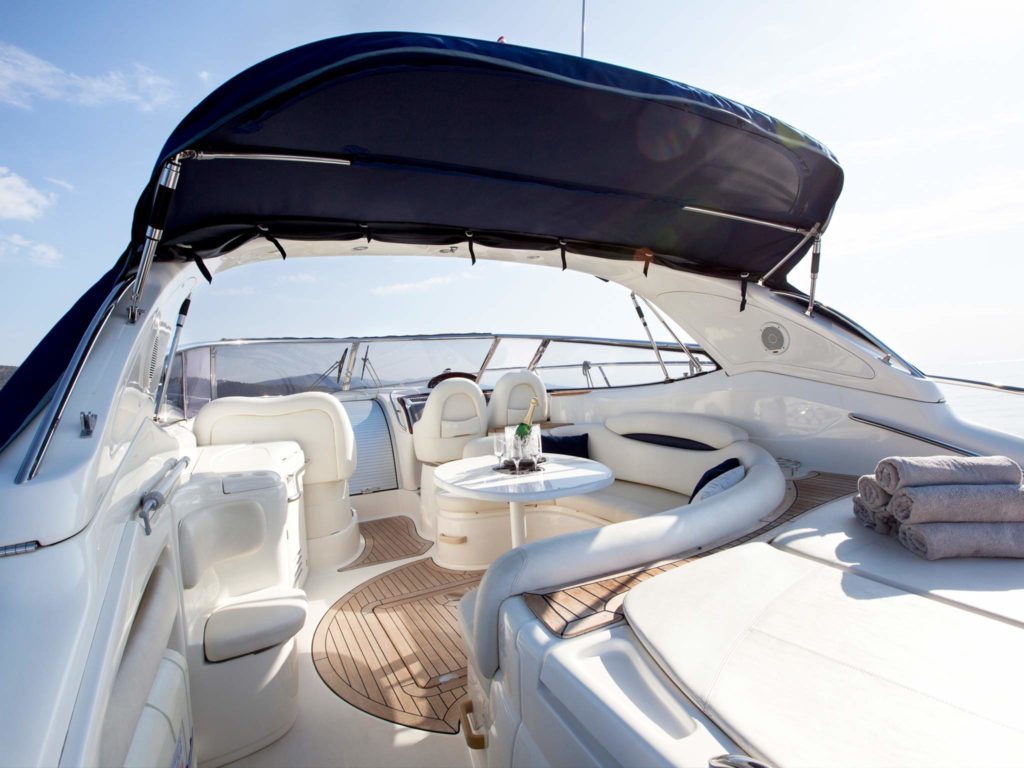Not all insurance coverage is the same. In fact, there is a whole category of insurance dedicated to the needs of high net worth households. Private Client Group Insurance provides complete insurance protection to those with more to protect. Similarly, boat and yacht insurance coverage varies greatly from company to company. Choosing the correct type and level of protection for your vessel is important to protect not only your investment, but also your passengers and crew.
Knowing the basics of boat and yacht insurance can help you decide which policy is best suited to your individual risks and needs. Your dedicated private client group risk professional is available every step of the way, to answer any questions and provide trusted advice.
Begin with the Basics: Liability and Physical Damage
Typical boat insurance programs are designed for boats up to 26 feet in length. Watercraft greater than 26 feet in length are considered yachts and require special yacht insurance. A standard boat or yacht insurance policy is made up of two basic sections: physical damage and liability.
What is Physical Damage and What Losses Does it Cover?
Physical damage provides coverage for any damage to the boat and its machinery or accidental loss. Physical damage covers the engine(s), outboard motors, the hull, the sails, the boat trailer, personal property and other equipment on board the boat that is required to operate the boat.
In general physical damage pays to have your boat repaired after it has incurred damage from various perils. Types of losses that are usually covered include weather-related perils such as windstorm, rain, lightning, hail, fire, and damage from wave action and other losses include damages from theft or vandalism, collisions with docks, floating or submerged objects or other boats.
Things to Remember when Reviewing Physical Damage Coverage:
- “The best policies provide “all-risk” coverage, which means that is the cause of the loss is not specifically excluded, it is covered.” (1)
- It’s important to select insurance coverage that protects your boat while in the water and also while it’s in storage over the winter months, and when you are transporting your boat via trailer.
- It is the boat owners’ responsibility to keep up with routine maintenance on their boat, similar to an auto policy, normal wear and tear is often excluded from a yacht or boat policy.
- Agreed Value vs. Actual Cash Value– Agreed Value policies mean you as the boat owner and the insurance company have agreed on the value of your vessel, and if you incur a total loss you will be paid that amount. Physical deprivation isn’t factored into determining the value of your lost or damaged items. Actual Cash Value policies provide less coverage than Agreed Value and generally cost less. With a total loss, Actual Cash Value policies pay for Replacement Costs less depreciation at the time of the loss. Payments made for partial losses are reduced based on physical depreciation and the deductible on the policy also applies. Your McSweeney & Ricci Private Risk Professional can help you determine which type of policy is best for your individual needs.
What is Liability Coverage and What Does it Protect Against?
Liability, (which is otherwise known as protection & indemnity) covers your legal responsibility to third parties. Legal liability results from bodily injury or loss of life, or even damage to someone else’s property, as a result of the operation or ownership of your yacht or boat. Liability protection helps pay for your legal defense if you are sued for an accident or occurrence that may be covered by your boat insurance policy. Personal liability coverage limits differ among insurance companies and a policy may contain company-specific exclusions. Our Private Client Group will provide guidance as to what limits are appropriate for your level of risk.

Important Coverage to Consider When Reviewing the Liability Portion of your Boat Insurance Policy:
- Coverage for removal or disposal in the event you wreck your boat.
- Containment and clean-up expenses resulting from oil pollution or contamination caused by your watercraft.
- When borrowing someone else’s boat you’ll want to confirm that your liability coverage extends to the other vessel. This is referred to as “non-owned” or operating other watercraft boat liability coverage.
- If you employ paid crew members, you’ll want to ensure your liability coverage extends to protect your crew members.
- Check to see if your liability coverage also includes your statutory liability to temporary shore-based workers, such as mechanics or marina employees. If you hire a mechanic to perform work on your boat and he or she becomes injured while aboard, without this coverage you may be left paying out of pocket for their injuries.
- If you intend to charter your boat to someone else or carry passengers for a fee, most yacht and boat policies will exclude coverage for these situations and you may need to secure insurance from a marine insurance company. Our team of experts can assist you in securing the proper coverage if you intend to charter your vessel.
Other Important Coverages to Consider:
Medical Payments Coverage-This coverage pays for first aid treatment, ambulance, hospital and other costs if someone is injured on your boat, (even if you aren’t legally responsible). When reviewing medical payments coverage it’s important to determine:
- Whether coverage extends to someone boarding or leaving your boat and while water skiing, knee boarding or tubing, and while being towed behind your boat.
- If injuries you and your family may incur are covered.
- Your personal risk manager can help you decide if coverage on a “per person” basis or on a “per accident” basis is right for you.
Underinsured/Uninsured Boater Coverage-Boat liability insurance isn’t mandatory and there are many boaters that operate their vessels without liability coverage. If purchased, uninsured boater coverage compensates you for injuries resulting from an accident that is the fault of an uninsured boat owner or “hit and run” operator.
Commercial Towing and Assistance-This coverage allows you to be reimbursed for the reasonable costs incurred if you break down at sea and need a commercial tow to port.
Factors that Determine the Cost of Your Boat Insurance
The insurance company underwriter has to consider numerous factors when determining the premium or rate of a boat policy including:
- the boat’s value,
- the length of the boat
- the boat’s age
- the type of boat (motor, sail)
- the type of engine
- the mooring location
- the area of navigation
- the boating experience of the owner
- the claim history of the owner
- deductible amount
The underwriter may also consider if the owner has taken any safe boating courses and the auto driving record of the owner.
Ways to Reduce your Boat Insurance Premium:
Request a Higher Deductible-Each higher deductible amount reduces your insurance premium. However, you must first consider what you could affordably pay out of your own pocket if you experience a loss.
Installed Safety Features – Installing certain safety measures on your boat and taking boating safety courses can sometimes reduce your premium. Automatic fire extinguishing systems in the engine area, some anti-theft alarms or trackers and fume or vapor detectors in the bilge may reduce premium.
Multi-Policy Discounts-Certain insurance companies offer Multi-policy discounts for placing your boat insurance and other insurance with the same carrier.
A Long Lay-up Period: Underwriters will normally allow a discount for months that your yacht or boat is out of commission and laid up, such as during the winter months. You can sometimes reduce your premium by requesting the longest possible lay-up period for your area of the country.
Navigational Area- If you only plan to navigate your boat close to home, you may not need coverage for a large area. Sometimes, narrowing your navigational area can help save money on your premium.
Trusted Advice from Boat Insurance Experts
The risk professionals in McSweeney & Ricci’s Private Client Group have over fifty years experience providing boat and yacht insurance to boaters from the south shore of Massachusetts and beyond. Our team will offer advice, help select coverage suited to your unique risks and lifestyle, and will craft a custom insurance plan to keep you protected. We’ve partnered with select insurance providers such as Chubb, PURE and Cincinnati insurance who specialize in providing insurance protection to high net worth individuals and families. Our Private Client Group provides high net worth home insurance, auto insurance, fraud protection in addition to complete yacht and boat insurance.
To discuss insurance for your boat, yacht, sailboat or other watercraft, with the boat insurance experts contact McSweeney & Ricci’s Private Client Group by calling (844) 501-1361 or Request a complimentary quote from our website.
Sources:
“Understanding Boat Insurance” chubb.com

